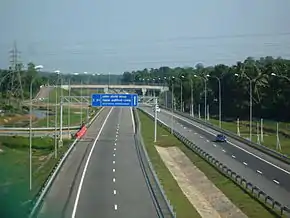 | |
|---|---|
| Colombo–Matara Expressway | |
 | |
| Route information | |
| Maintained by the Road Development Authority | |
| Length | 222 km (138 mi) |
| Existed | 27 November 2011–present |
| History | Kottawa-Galle section opened on 27 November 2011. Galle-Matara section opened on 15 March 2014. Matara-Hambantota Section opened on 23 February 2020. |
| Major junctions | |
| North end | Kottawa A4 - Start of E02 Colombo Outer Circular Expressway |
| Interchange 2 → B84 in Kahathuduwa - Start of E06 Ruwanpura Expressway Interchange 3 → A8 in Gelanigama | |
| South end | Mattala B631 |
| Location | |
| Country | Sri Lanka |
| Provinces | Western Province, Sri Lanka, Southern Province, Sri Lanka |
| Towns | Panadura, Kalutara, Matugama, Bentota, Elpitiya, Ambalangoda, Galle, Matara, Aparekka, Beliatta, Agunukolapelessa, Mattala, Hambantota |
| Highway system | |
| |
The Southern Expressway (Sinhala: දක්ෂිණ ලංකා අධිවේගි මාර්ගය, romanized: Dakśina Laṃkā adhivēgi mārgaya; Tamil: தென்னிலங்கை அதிவேக நெடுஞ்சாலை) is Sri Lanka's first expressway. The 222-kilometre-long (138 mi) highway links the Sri Lankan capital Colombo with Galle, Matara and Hambantota, major cities in the south of the island.
The Southern Expressway Project (SEP) was introduced by the Road Development Authority and the Ministry of Highways as far back as late 1980s. The University of Moratuwa undertook an Environment Impact Assessment study in 1996, which was submitted to the government in early 1997.[1][2][3]
Construction of the highway began in 2003 and completion up to Galle was achieved by November 2011. March 2014 saw the section from Galle to Matara being declared open to the public. The construction of the expressway was partly funded by the Japan Bank for International Cooperation, who were responsible for the 65 km (40 mi) section between Kurundugahahetekma and Kokmaduwa, and the Asian Development Bank, responsible for the 161 km (100 mi) section between Kurundugahahetekma and Pinnaduwa. The expressway reduces the time taken to travel from Colombo to Galle (116 km (72 mi)) to one hour from three hours, and Colombo to Matara (29.3 km (18.2 mi)) to one and a half hours from four hours taken by the regular A2 highway.
The extension of the expressway to Hambantota was inaugurated on 4 July 2015. The extension will be four lanes (with allowance of further two lanes in future), the cost of US$180M being funded by the Exim Bank of China.[4]
On 10 August 2015, a Highway Traffic Management system was inaugurated and currently covers the length of the expressway, including the Outer-Circular Expressway.
On 23 February 2020, The final stage of the expressway which links to Hambanthota was opened to the public.[5][6]
Intersections
| Mileage | Interchange | Name | Destinations | Notes |
|---|---|---|---|---|
| 0.0 | 1 | Kottawa | A4 – Kottawa (1.8 km), Maharagama (6.3 km), Nugegoda (11.3 km), Colombo (20.6 km), Ratnapura (79.1 km), Avissawella (37 km), Homagama (2.2 km) | The start of the expressway; a continuation of the E02 Colombo Outer Circular Expressway |
| 5.9 | 2 | Kahathuduwa | B084 – Kesbewa (5.8 km), Piliyandala (8.1 km), Colombo (25.7 km), Horana (12.3 km), Ingiriya (25.9 km), Ratnapura (63.5 km) | This intersection will be the beginning point of E06 Ruwanpura Expressway, which will connect Rathnapura to the national expressway network. It was scheduled to be opened in 2019. |
| 13.7 | 3 | Gelanigama | A8 – Bandaragama (1.8 km), Panadura (11.6 km), Horana (6.9 km), Ingiriya (20.4 km), Ratnapura (58.1 km) | |
| 34.8 | 4 | Dodangoda | B304 – Nagoda (11.5 km), Kalutara (17.0 km), Matugama (5.5 km), Kalawana (36.3 km) | |
| 46.0 | 5 | Welipanna | B157 – Aluthgama (10.3 km), Matugama (11.5 km), Agalawatte (17.5 km) | |
| 67.6 | 6 | Kurundugahahetekma | B014 – Elpitiya (3.8 km), Karandeniya (6.0 km), Batapola (7.0 km), Ambalangoda (13.2 km), Balapitiya (13.5 km) | |
| 79.8 | 7 | Baddegama | B153 – Baddegama (1.5 km), Hikkaduwa (12.8 km), Nil Hena (2.4 km), Udugama (20.8 km) | |
| 95.3 | 8 | Pinnaduwa | B594 – Galle (8.4 km) |
Earnings and traffic volumes
| Year since opening | Annual earnings (billion) Rs | Average daily earnings (USD) | Annual traffic volume (million) | Average daily traffic volume | ROI on capital (billion) Rs | Earning per KM (USD) |
|---|---|---|---|---|---|---|
| 2012 | 0.975 | 21,000 | 3.3[7] | 9000 | -125.25 | 80,500 |
| 2013 | - | - | - | - | - | - |
| 2014 | - | - | - | - | - | - |
Toll structure
Toll collection is currently done manually in cash by toll collectors. An electronic toll collection system has been proposed.[8]
See also
References
- ↑ "opinio06". Island.lk. Retrieved 22 July 2016.
- ↑ "Plus". Sundaytimes.lk. Retrieved 22 July 2016.
- ↑ "REGAINING SRI LANKA" (PDF). Erd.gov.lk.
- ↑ "Construction of Matara - Hambantota Expressway launched". Colombo Gazette. 22 August 2015.
- ↑ "Final stage of Southern Expressway linking Hambantota- Mattala, Colombo vested with the public". Pmdnews.lk. 23 February 2020. Retrieved 28 February 2020.
- ↑ "Sri Lanka : President opens Southern Expressway extension linking Colombo to Hambantota-Mattala for public". Colombopage.com. Retrieved 28 February 2020.
- ↑ "Southern Expressway Earns Rs.975 Million - The Daily Mirror (Colombo, Sri Lanka) | HighBeam Research". 29 March 2015. Archived from the original on 29 March 2015. Retrieved 8 November 2021.
- ↑ "EOM&M Division". Exway.rda.gov.lk. Retrieved 8 November 2021.